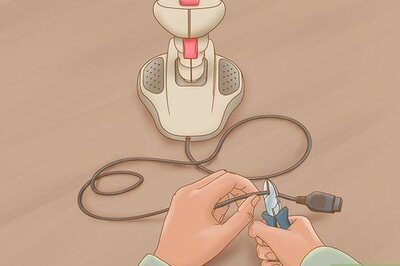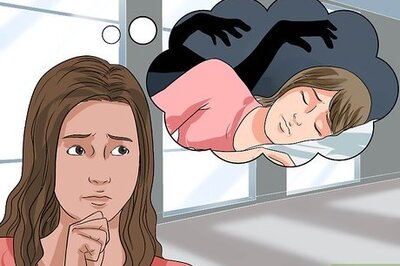
views
X
Trustworthy Source
Harvard Medical School
Harvard Medical School's Educational Site for the Public
Go to source
Removing Floaters

Don’t do anything. Be patient and most floaters will go away without any medical intervention. If you do feel you need your floaters treated, don't try to remove them yourself. See an ophthalmologist for diagnosis and treatment. Keep this information in mind: Leaving your eyes alone will let your eyes absorb floaters naturally. Let your eyes get used to the floaters and you will become less aware of them over time. If your floaters turn red or start causing pain, you should seek immediate help from a health care professional.

Try taking antioxidant vitamins. Taking this medicine helps people with another eye condition called macular degeneration, so some doctors think that these might help with floaters too. Choose an antioxidant from this list: Rosehips Turmeric Hawthorn berry Propolis concentrate

Try taking supplements to increase blood flow. Increased blood flow might help your eyes better flush out the gelatinous protein from the vitreous. Choose a supplement, such as the ones below: Ginkgo Biloba Lysine Bilberry

Try taking over-the-counter medicines. Taking medications that help with other related conditions might help. Try one of these: Anti-inflammatory medicine such as aspirin. Methylsulfonylmethane Hyaluronic Acid

Maneuver your eyes. Try following these suggestions on how to move your eyes if you want to reduce eye floaters: Move your eyes up and down to shift the fluid in your eyes. Open and close your eyes. Move your eyes so that you are not staring directly at your floaters.
Preventing Floaters

Eat properly. Promote eye health by eating these foods: Eat foods that are high in antioxidants like spinach, broccoli, kale, kiwi, and grapes. Eating antioxidants will protect your eyes. Eat foods that are high in Vitamin C like oranges, grapefruits, strawberries, and green peppers. Eating Vitamin C will help you build up your immune system. Eat foods that are high in Vitamin E like sunflower seeds, almonds, pecans and wheat germ. Eating Vitamin E will keep your eyes strong.

Sleep properly. Getting enough sleep will help stop floaters from forming. Keep these things in mind: Try to sleep at least 8 hours a night. Sleeping helps to keep your eyes healthy. Realize that floaters may be more apparent if your eyes are blurry from not getting enough sleep.

Reduce stress. Practicing stress management techniques will help stop floaters from forming. Prevent stress by doing one of the following: Meditate Yoga Pilates Tai Chi Be positive. Breathe deeply.
Seeking Medical Attention

Determine if you need to see a doctor. Recognize that while 98% of floaters are harmless, you need to know if your floaters are symptoms of a more serious condition. See a doctor right away if you experience any of the following: Loss of sight. Blurry or clouded vision. Eye pain. Flashes of light. Red floaters. Floaters that appear after eye surgery or trauma. Floaters that appear suddenly. A significant increase in floaters, especially if combined with flashes of light.

Recognize the risks of an underlying condition. Make sure to see a doctor immediately if you experience symptoms that could be the sign of more serious problem. Find out if you may have any of these medical conditions: Retinal tear Retinal detachment Vitreous hemorrhage (bleeding between the lens and the retina) Vitreous and retinal inflammation (caused by infections or auto-immune inflammation) Eye tumors Diabetic retinopathy

Find out if you’re at risk. Be aware that certain groups of people experience floaters more than the rest of the population. Watch out for eye floaters if any of the following apply to you: You’re nearsighted. You’re between the ages of 50 and 75. You’ve had cataract surgery.

Know your treatment options. Be aware that all of these options carry risks, so most doctors won’t perform them unless absolutely medically necessary. Ask your doctor about these treatments if you have a dangerous underlying condition that is causing your floaters: Vitrectomy Surgery. This procedure removes the vitreous gel from the middle of the eye. Laser treatments. This procedure breaks up eye floaters by the use of a YAG laser. Although some ophthalmologists have advocated this treatment option, there is no evidence that this is both safe and effective.




















Comments
0 comment